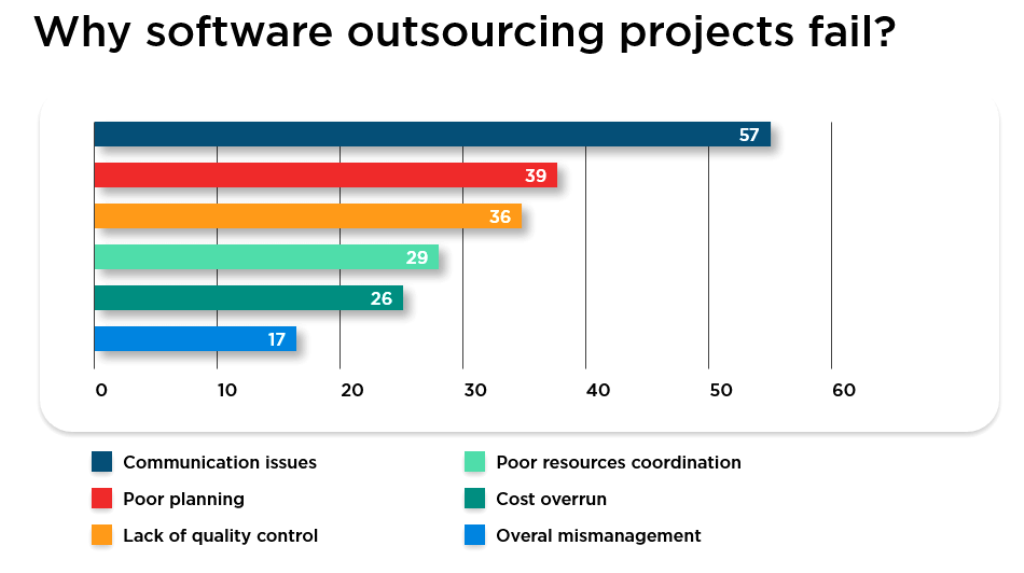In the context of the global economy and the constant development of technologies, neglecting outsourcing software development opportunities today means missing out on a business-defining effort. Companies need disruptive technology combined with cost reduction and risk management. Offshore outsourcing is coming to the forefront of the global market, dramatically changing the business economy thanks to qualified personnel with low-cost services.
According to a Deloitte survey, about 70% of respondents use outsourcing to reduce costs, another 40% to ensure workflow flexibility, and 57% believe that outsourcing allows you to better focus on your core business aspects.
If you are also thinking about software outsourcing, you need to know the common mistakes that you should avoid. The successful experience of other companies, for instance, IDAP, can serve as a great guide.
Dangerous Mistakes Made When Outsourcing Software Development
Clients benefit from offshore outsourcing because vendors in developing countries cost less to hire. However, the outsourcing format involves many risks, like the following.
1. Lack of trust
Trust is a great power. Its lack can kill any relationship, especially a business-based one. Development outsourcing requires a solid foundation that can be laid only by those parties who fully trust each other and fully invest in the project. That’s why it’s best to clarify the following questions in the early stages of communication with the outsourced developer:
- Is he/she qualified enough to do the required job?
- How much can he/she impact business processes as a whole?
- Is he/she asking the appropriate questions?
- Do I have the time to assist him/her in the course of the project workflow?
On top of that, every conversation, email, comment, and call will either build or erode trust. This is doubly true if the planned milestone is not reached within the agreed timeframe and the developer does not report it. A reliable partner must be honest and open, and the commitment to project success must be mutual.

Many people think that trust builds over time, but this is a dangerous strategy. Try to encourage trust and commitment from day one. Build relationships, not just software.
2. Lack of consistent plan
There should always be a plan, especially when it comes to business strategizing. Choosing the right time to outsource development is an important step. You should notice the first signs of a need for outside help and decide what exactly to outsource.
Define your goals and outline milestones by which to navigate, visualize how the plan must be implemented. Once you pass on all the side tasks, you can focus on the core product aspects.
Pick a programming outsourcing model according to your business requirements. The project model is more convenient because outsourcing companies have complete control of the project from start to finish. The model with the involvement of external staff will allow you not to worry about delegated processes because they are completely manageable. With outsource coding, you do not need to spend time and resources managing your team.
Calculate the financial cost to achieve your goals. Be prepared for unexpected expenses. Sometimes “hidden costs” can include management, unplanned logistics, new IT infrastructure requirements, and so on.
A reputable intermediary can help uncover hidden costs and balance availability and great results. Switch your engagement model to an end-to-end solution with crystal clear pricing. Outsourcing developers should be able to help you put together a detailed project plan that includes all possible scenarios.
3. Communication breakdowns
The outsourcing development process must be continuous. Communication in this matter is critical. It must be constant. If this is not the case, identify and eliminate the causes. When partners fail to communicate properly, they inevitably become frustrated with each other.
Difficult technical issues are simpler to discuss with modern communications that guarantee high audibility and intelligibility of speech. Sometimes, a cultural gap gets in the way, which is difficult to overcome without specialists. Accents can be significant, some words are lost during translation, there may be a feeling that there is no understanding and sincere desire to help. Hire a professional translator who understands your developer’s accent if you’re faced with a language barrier.
Organize a 24/7 call center service in case of time zone differences. If you have a problem with a misunderstanding of goals or inconsistency in achieving them, do not hesitate to get in touch outside the planned time and schedule.
The lack of transparent and frequent communication sometimes leads to the fact that the potentially best projects never get off the ground. Create an effective communication model with multiple communication channels. Mobile, preferably. Try to break down all communication barriers as quickly as possible.
4. Lack of project scope understanding
Parties working on one project must equally understand its meaning and objectives. Misunderstandings and discrepancies should not be even in the smallest detail. A common vision of goals and precise coordination of tasks will allow you to get the required result.
The type and size of a software project that you transfer to outsourcing software development poses specific tasks and requires individual solutions. If you ignore the differences, you will greatly reduce the chances of a successful outcome.
The initial definition of objectives should be complete, unambiguous, and consistent. Define both functional and non-functional requirements and content change management will not be a major issue for the developer. They will be able to accurately estimate the workload before starting work, and you can expect to receive a fixed cost.
Before submitting a project to outsource programming, clarify the requirements, expected results, deadlines, and overall scope of the project. Without this, software engineers will not be able to work consistently, and the gap between your expectations and actual results will widen. Present the outsourcing provider with clear and justified requirements, both in terms of results and in terms of time. Be sure to provide them with clear documentation as well.
A Software Requirements Specification (SRS) document can be a good starting point. The development team will then add extra details and possible scenarios to it, but this will allow a general plan to be developed before starting work.
5. Temporary project managers
There are many reasons why organizations choose to hire a contract project manager. Using an internal team member with no experience in this capacity can lead to costly mistakes. Additional responsibility can negatively affect the performance of normal duties.
Outsourcing software development allows you to hire an expert with a specialized skillset and extensive project experience who knows the best practices to follow. You will only have to pay for the working hours that are needed for the project, so hiring a project manager will be cheaper.
Make sure you have at least one project manager who is involved in the project from start to finish. They get to look at the business impartially, without the emotions associated with company policy. This allows them to see issues that are often overlooked by internal team members, as well as make difficult decisions about how to reduce costs or improve processes without risking affecting company policy.
But keep in mind that an outside contractor will not adhere to established relationships within your team, which can be a problem in building trust. Likewise, everyone has their own unique communication styles and it can take time to figure out how best to communicate.
6. Unclear contracts
Ambiguities in agreements and deals lead to ambiguous responsibilities, team roles, and a lack of accountability. Drafting a contract free of legal loopholes ensures that you don’t miss any important issues.
Make sure to clearly define the following in the contract:
- expected outcomes and a timetable for their implementation;
- establishing contacts based on achievement of functions, not time;
- phased payment schedule;
- prohibition on acceptance of applications without guarantee of outsourcing coding;
- acceptance testing period (optimal ─ 5-10 days);
- how and for how long technical support will be provided;
- intellectual property rights;
- privacy agreement;
- indemnification clauses – legal costs for claims arising in connection with the product being developed;
- a termination clause that clearly sets out the actions to be taken if the project is folded.
7. Software doesn’t meet customer goals
If you don’t get what you pay for, it’s probably because of a fuzzy plan with incomplete customer research. If the finished product does not meet the parameters stipulated in the contract, the issue, of course, can be resolved. But you will waste time, some market opportunities, and possibly project perspective.
While goals such as “high quality”, “speed”, or “low cost” are important, it is even more important to clarify specific “technical” objectives. To avoid discrepancies in the assessment of the final product, it is necessary to achieve the same understanding of all its “subtle” points. When leadership sets clear and specific goals, it gives the team the opportunity to make the project successful.
To achieve an effective outsource computer programming strategy, it is critical to define both long-term and short-term requirements and prepare written responsibilities and expectations for the development team.
Clearly formulate goals, recommendations, wishes and document them. Explain the values of your business and the unique nature of a particular project, its importance to the market, etc. This is the only way to achieve a common vision of the created product and consensus in its implementation. The more requirements and specifications you mark in the terms of reference, the more chances that the new product will fully meet your expectations.
8. Poor outsourcing programming partner
The best choice is a service provider who is not only knowledgeable in your industry, but also fully aligned with your business goals and culture. Even if you have to spend a little more time looking for a foreign partner, it will save you a lot of trouble in the future.
Do your research. Make a list of promising software engineer outsource companies based on a comparison of the range of services, benefits, and other selling points that they declare. Compare your and their views on values, culture, communication, and the rule of law. It is important to analyze the following points:
- Supported service models;
- Field of expertise;
- Project portfolio;
- Collaboration approaches;
- Previous clients’ and field experts’ feedback.
After the analysis, you can meet with company representatives to find out their commitment to the future project, experience in this area, and ability to solve your problems first-hand. They should teach you new skills, not the other way around. You should know what to do and they should provide options on how to do it.
Analyze the capabilities of everyone you can work with. Also, feel free to ask for resumes from individual developers or offshore team members to ensure you are hiring the best talent. Read reviews, visit websites, video chat, and do other things to make sure that your partner is professional.
9. Too much focus on saving costs
Yes, outsourcing software development is cost-saving, but trying to save on everything can lead to the fact that the developer loses attention to the client’s values. The drive to reduce costs often means paying a higher price. When planning a budget, companies often set unrealistic goals. To maintain the integrity of the final product and reduce costs, it is important to avoid such mistakes as:
- wrong choice of cooperation model;
- unclear and changing requirements;
- ineffective management strategies.
Software outsorcing should help optimize your business in order to free up time for strategic tasks. Choose a company with the best value for money. Don’t look for the lowest rates. It is best to determine your budget in advance and then find a partner that suits it.
Do not choose a fixed price for software project outsourcing if possible. A fixed budget gives you a sense of control and safety as your service provider bears all the financial risks, but there are many other things to worry about, and end quality is one of them.
On top of that, projects with a fixed price are always more expensive due to the inclusion of potential risks. It is almost impossible to foresee all the nuances in advance, so a change in the amount of work is inevitable. This will lead to cost overruns. The quality of work may suffer as a software outsourcing company will have to focus on achieving an agreed price rather than striving to create a better software product.
10. Poor collaboration with in-house teams
Having decided to outsource software development, you will have to make many changes to the management and organizational structure of your company. Your teams will be expanded with offshore developers who can work in different time zones.
You must prepare your internal team to work effectively with your new colleagues. Do this as quickly as possible and make sure everyone in your organization understands this.
Explain to your employees the reasons for choosing software outsourcing, its potential benefits. This will help you avoid possible resistance to the process and increase its efficiency. Brief your team on how they should work with partners.
Discuss possible interaction models, talk about outsourcing software for collaboration and required project management tools. Encourage your people to collaborate with the new team in a productive and friendly way. Make changes to your daily routine so that the internal development team coordinates with remote colleagues.

Summary
Outsourced software development is full of opportunities for innovation and market competitiveness. However, it is fraught with a number of potential issues. Understanding the criteria for evaluating software development service providers helps to solve them, both for clients and developers. Contact IDAPGroup to learn all about how effective software engineering outsourcing is done.



